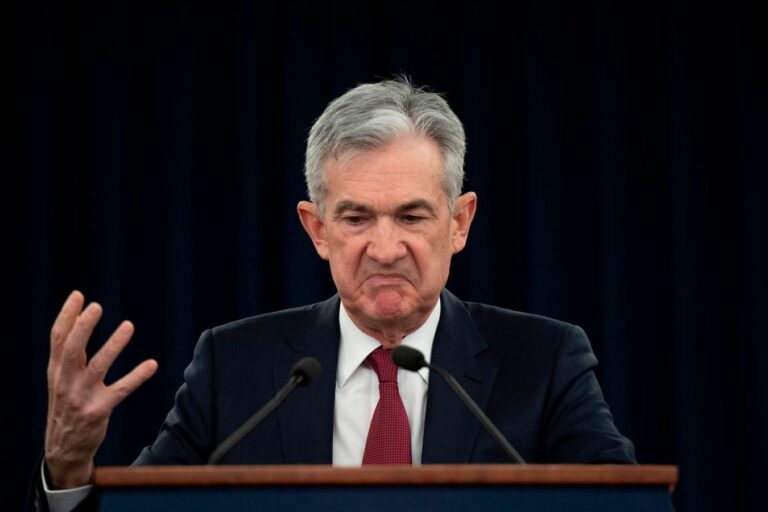While the global economy faces turmoil, the United States faces a critical financial challenge: the steady decline in the purchasing power of the dollar.
US Federal Reserve Chairman Jerome Powell (Photo by Jim Watson/AFP)
AFP via Getty Images
The United States is monitoring shifts in the dollar's global influence
While the global economy is going through turbulent times, the United States faces a major financial challenge: the continuing decline in the purchasing power of the dollar.
Persistent inflation continues to diminish the value of money, forcing some new elected officials in the United States to explore innovative measures to secure economic stability. Among the bold strategies on the table is integrating Bitcoin into the national balance sheet, a move that could redefine the country's fiscal framework.
This potential shift highlights the urgent need for forward-thinking solutions in the face of continuing economic pressures.
Erosion of purchasing power
Purchasing power refers to the amount of goods and services that a unit of currency can purchase.
An example of this is the trend in the purchasing power of the dollar from October 2020 to November 2024, as the following chart shows.
US Consumer Price Index: The purchasing power of the consumer dollar
https://ycharts.com/indicators/us_consumer_price_index_purchasing_power_of_the_consumer_dollar_unadjusted#:~:text=Basic%20Info,2.76%25%20from%20one%20year%20ago
During this period, the index fell from 38.40 in October 2020, to 31.70 in November 2024, a decrease of 17%, indicating a continuing decline in the dollar’s ability to purchase goods and services.
This decline is directly related to inflation, which reduces the value of money, requiring consumers to spend more dollars to maintain their standard of living.
Although there are slight fluctuations and short periods of stability, the overall downward trend highlights the ongoing challenge of the declining purchasing power of the US dollar.
This stark reality underscores the urgent need to take preventive measures against inflation.
International perspectives and strategic considerations
On December 19, 2024, the International Monetary Fund considered the idea of having national Bitcoin reserves in the United States. At a press conference, Ms. Kozak, an IMF official, addressed questions regarding the possible creation of a strategic Bitcoin reserve by the United States.
“It's too early, of course – well, we won't speculate on possible policies,” Kozak said.
The IMF has historically advised caution against public sector exposure to cryptocurrencies, but the evolving financial landscape suggests that a reassessment may be imminent.
A strategic shield against inflation
Given its limited supply and decentralized nature, some argue that keeping Bitcoin on the U.S. balance sheet could help mitigate risks associated with a decline in the value of the dollar and enhance financial resilience.
Bitcoin's strategic reserve could undermine the stability of the US dollar
Establishing a strategic Bitcoin reserve does not receive unanimous praise.
Venture capitalist Nick Carter is a prominent critic of creating a strategic reserve for Bitcoin. He argues that if the US acquires a large amount of Bitcoin, it will likely weaken the US dollar rather than strengthen it. Carter points out that since the United States already issues the world's reserve currency, there is no need to hedge against the stability of the dollar.
Furthermore, the addition of Bitcoin to national reserves may be interpreted as a loss of confidence in the dollar, which could lead to instability in financial markets and an increase in the global cost of capital. He contends that the Bitcoin Strategic Reserve is neither necessary nor beneficial to the US economy and will likely do more harm than good by undermining the dollar and provoking a political and public backlash.
The compelling nature of decentralization
Decentralization is one of the most attractive attractions of Bitcoin.
Deloitte, one of the world's largest and most prestigious accounting firms, states, “Cryptocurrencies provide unique investment opportunities, serve as an alternative asset to hedge against inflation, and enhance traditional treasury functions such as secure money transfers and capital monitoring.”
Unlike the current dollar-centric system, where one country controls monetary policy, Bitcoin operates on a global network governed by its users.
Deloitte emphasizes that integrating cryptocurrencies into corporate finance strategies can drive innovation and improve financial inclusion. It also highlights the need for strong regulatory frameworks to ensure the safe and efficient adoption of digital assets.
The incoming Trump administration has clearly stated its commitment to expanding the digital asset sector in the United States over the next four years.
Is Bitcoin an ally or enemy of the dollar?
The continuing decline in the purchasing power of the US dollar represents a major economic challenge that requires strategic and proactive measures.
Integrating Bitcoin into the national balance sheet emerges as a viable option to mitigate inflationary pressures, enhance financial stability, and enhance economic sovereignty. As the global financial landscape continues to evolve, the adoption of Bitcoin could strategically position the United States at the forefront of economic resilience and financial innovation.
Adopting such innovative solutions would overcome the current economic headwinds and create an environment where the US dollar remains the global reserve currency for many years to come.
